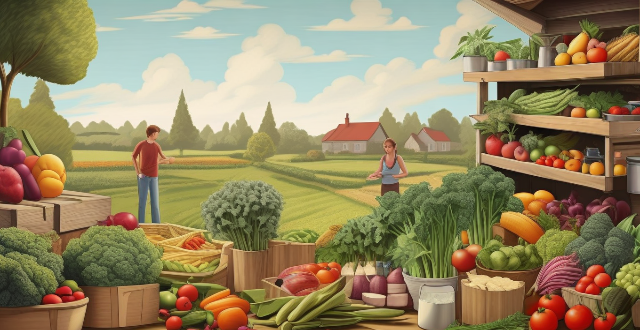When it comes to grocery shopping, one common dilemma is whether to pay extra for organic produce. Organic food items are often pricier than their conventional counterparts, leading many consumers to question if the added cost is truly worth it. Here, we'll explore the benefits and drawbacks of choosing organic options and help you decide if spending more on organic produce aligns with your values and budget. Benefits of Organic Produce include health considerations such as no pesticides or chemicals and higher levels of certain antioxidants, environmental impact such as sustainable farming practices and less water pollution, and support for local farmers through community support and fair labor practices. Drawbacks of Organic Produce include higher costs, limited availability, nutritional value controversy, and perceived benefits. Making the decision depends on individual priorities such as health goals, environmental concerns, financial feasibility, cost comparison, dirty dozen/clean fifteen lists, and farmers markets and CSAs.

Is it Worth Paying Extra for Organic Produce at the Grocery Store?
When it comes to grocery shopping, one common dilemma is whether to pay extra for organic produce. Organic food items are often pricier than their conventional counterparts, leading many consumers to question if the added cost is truly worth it. Here, we'll explore the benefits and drawbacks of choosing organic options and help you decide if spending more on organic produce aligns with your values and budget.
Benefits of Organic Produce
Health Considerations
- No Pesticides or Chemicals: Organic produce is grown without synthetic pesticides, herbicides, or fertilizers. This means fewer chemical residues on your food, which can be especially important for health-conscious consumers.
- Antioxidants: Some studies suggest that organic fruits and vegetables may have higher levels of certain antioxidants, which are beneficial for overall health.
Environmental Impact
- Sustainable Farming Practices: Organic farming methods prioritize soil health, biodiversity, and reduced pollution, making them more sustainable in the long run.
- Less Water Pollution: The absence of chemical runoff from organic farms helps maintain water quality in nearby streams and rivers.
Support for Local Farmers
- Community Support: Buying organic often means supporting local farmers who use these methods, strengthening the local economy and fostering community connections.
- Fair Labor Practices: Many organic brands emphasize fair trade and ethical labor practices, ensuring workers are treated well and fairly compensated.
Drawbacks of Organic Produce
Higher Costs
- Price Difference: Organic produce typically costs more than conventionally grown items, which can strain household budgets, especially for families on a tight leash.
- Limited Availability: Not all grocery stores carry a wide selection of organic products, and some items may not be available year-round.
Nutritional Value Controversy
- Debate Over Nutrients: While some research suggests organic produce has more nutrients, other studies find no significant difference between organic and non-organic items in terms of nutritional content.
- Perceived Benefits: Some people believe that the perceived health benefits of organic food are overstated and do not justify the higher price tag.
Making the Decision
Evaluate Your Priorities
- Health Goals: If reducing chemical intake is a priority, organic might be worth the extra cost.
- Environmental Concerns: For those focused on minimizing environmental impact, organic choices align closely with sustainability goals.
Consider Your Budget
- Financial Feasibility: Assess if your budget allows for the regular purchase of organic items without causing financial strain.
- Cost Comparison: Sometimes buying in-season or on sale can make organic options more budget-friendly.
Look for Alternatives
- Dirty Dozen/Clean Fifteen: Focus on buying organic versions of the "Dirty Dozen" fruits and vegetables that tend to have higher pesticide residues, while sticking with non-organic versions of the "Clean Fifteen," which have lower amounts.
- Farmers Markets and CSAs: These sources often offer organic produce at lower prices than traditional supermarkets.
In conclusion, whether it’s worth paying extra for organic produce at the grocery store depends on individual values, health considerations, environmental concerns, and financial resources. Weighing these factors can guide you in making an informed decision that fits your lifestyle and priorities.